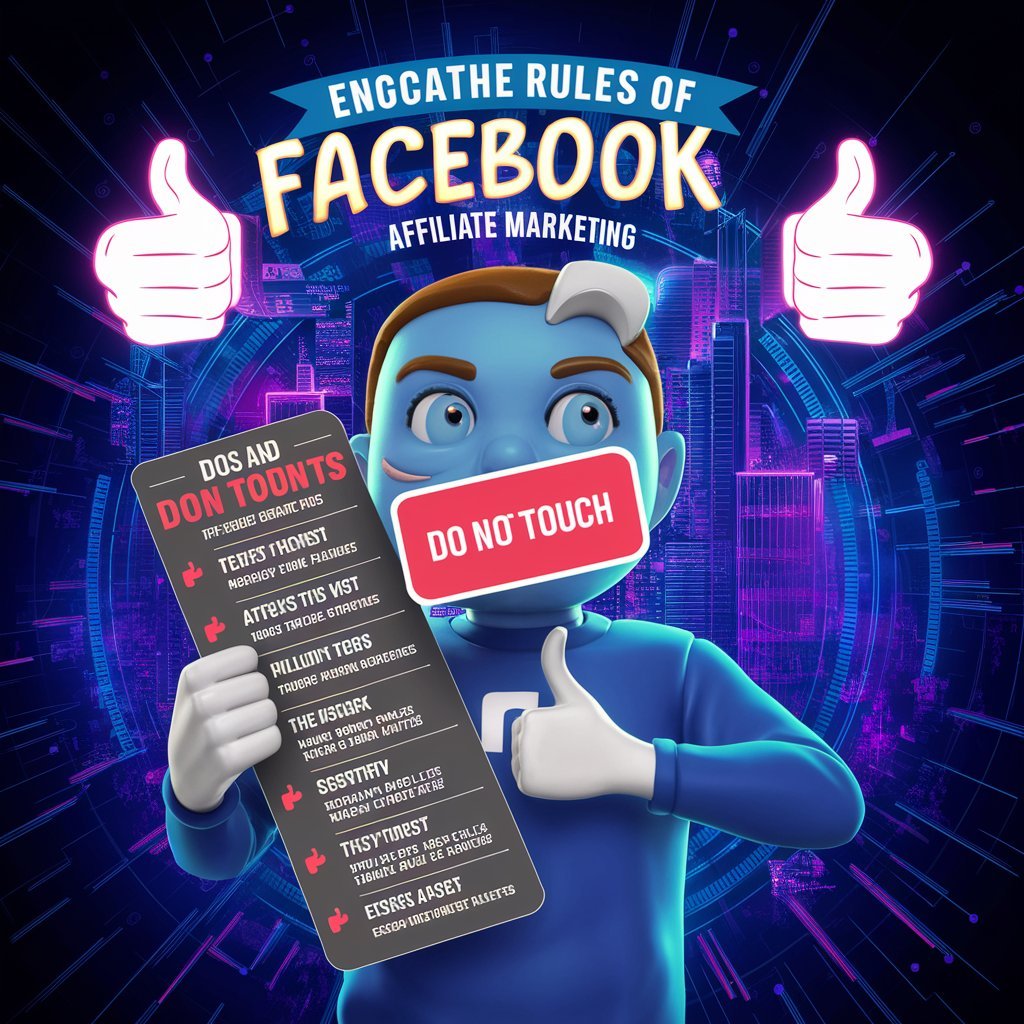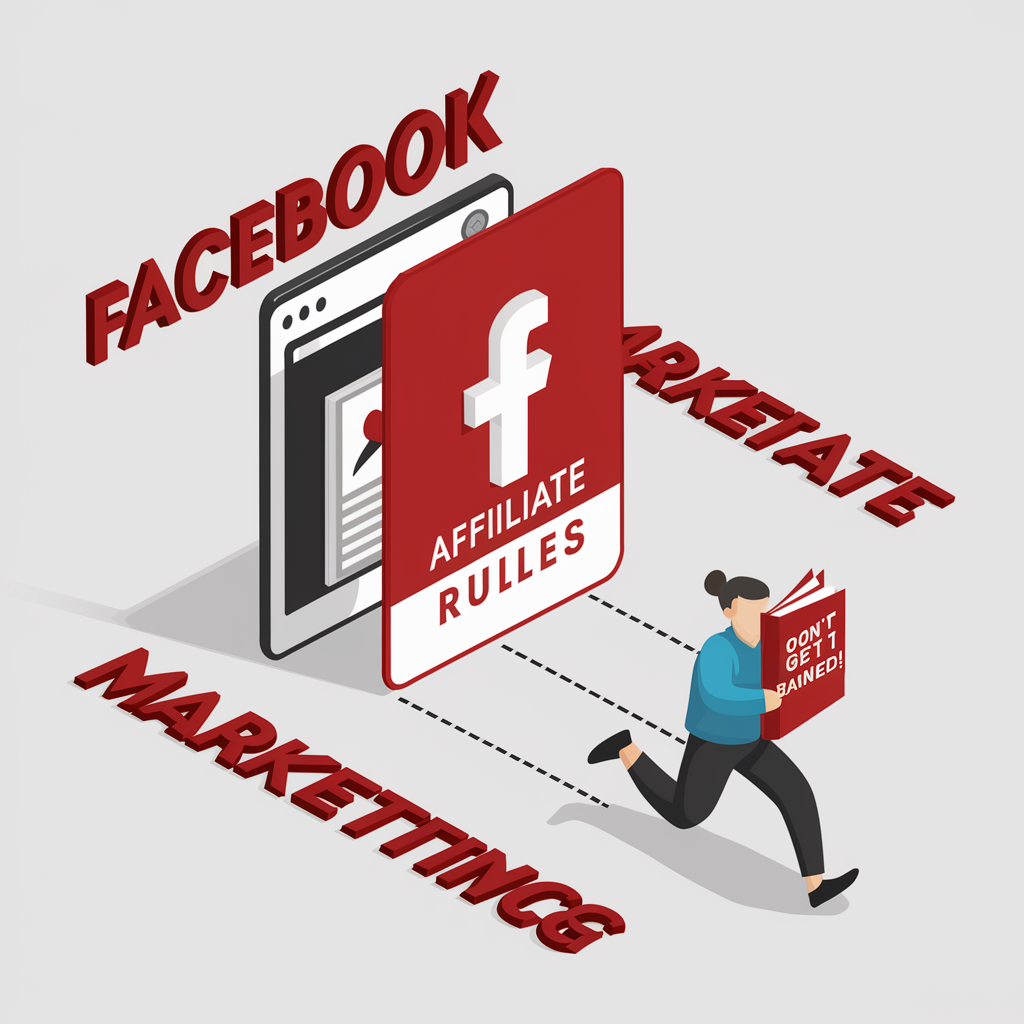Facebook Affiliate Marketing Rules: Don’t Get Banned!

●Facebook Affiliate Marketing Rules: Don’t Get Banned! Understanding Facebook’s Policies:
It’s critical to have a thorough understanding of Facebook’s standards surrounding promotional content before starting any affiliate marketing initiatives there. Facebook, one of the biggest social media networks in the world, has set strict rules to protect the ecosystem’s integrity and guarantee a satisfying user experience. Affiliate marketing is included in the range of advertising and promotional activities covered by these policies.

Facebook’s policies are meant to shield users from dangerous or deceptive content while promoting an open and reliable environment for advertising. You may make sure that your affiliate marketing efforts adhere to Facebook’s guidelines and reduce the possibility of fines or account limitations by being familiar with their policies.
Rule #1: Disclose Your Affiliation
The foundation of ethical Facebook affiliate marketing is transparency. Facebook’s regulations state that you must clearly declare any relationship you have with any brands or products you recommend using affiliate links. To ensure that users are aware of the possible financial benefit you may earn if they make a purchase through your link, this disclosure has to be obvious and prominent. In addition to facing penalties from Facebook, failing to disclose your affiliation might damage your audience’s perception of your trustworthiness and earn them less trust.

Think about utilising plain wording to disclose your involvement, like “This post contains affiliate links” or “I may earn a commission if you make a purchase through the provided links.” Furthermore, it’s critical to include disclosure statements in obvious places where others can see them, like the description of your Facebook page or the caption of a post.
Rule #2: Avoid Deceptive Practices
Facebook forbids affiliate marketing programmes from using dishonest tactics. This covers any type of deceptive or fraudulent advertising, such as highlighting a product’s features or hiding crucial terms and limitations. In order to adhere to Facebook’s regulations and preserve the confidence of your target audience, your promotional content needs to be truthful, accurate, and transparent.

Make sure the qualities and advantages of the products you’re advertising are appropriately portrayed in your marketing communications to prevent engaging in dishonest business activities. Steer clear of making inflated statements or unsubstantiated promises. Furthermore, make any terms, conditions, or restrictions pertaining to the products—such as those pertaining to cost, delivery, or return guidelines—clear and understandable.

Rule #3: Respect Intellectual Property Rights
It is crucial to uphold intellectual property rights while endorsing affiliate products on Facebook. This means not utilising content that is protected by copyright, including pictures or films, without the appropriate permission. Furthermore, it’s critical to refrain from violating trademarks or falsely linking your content to well-known companies. In addition to facing legal repercussions, violating intellectual property rights may result in Facebook sanctions, such as account suspension or termination.

utilise only original content or acquire the required permission to utilise copyrighted resources in order to ensure compliance with intellectual property regulations. Refrain from utilising third-party trademarks, logos, or other intellectual property without authorization when producing promotional content. Additionally, exercise caution when using films or images that can violate someone else’s rights, such as stock photos with limited usage permits.
Rule #4: Comply with Community Standards
Facebook sets community standards that set guidelines for appropriate behaviour on the network in addition to its advertising policies. As you participate in affiliate marketing, it is imperative that your material complies with these guidelines. This includes abstaining from any language, images, or topics that might be deemed offensive or improper and in violation of Facebook’s community guidelines. You can lessen your chance of getting blocked or banned from the platform by continuing to behave in a kind and cooperative manner.

Refrain from using any language or imagery that could be construed as offensive, discriminatory, or provocative in order to adhere to Facebook’s community standards. Furthermore, abstain from manipulative or spammy practices like clickbait, excessive tagging, and engagement baiting. You may improve the efficacy of your affiliate marketing campaigns and establish enduring connections with your audience by cultivating a courteous and upbeat community atmosphere.
●Best Practices for Facebook Affiliate Marketing:
Adhering to Facebook’s guidelines and regulations as well as putting best practices into practice will help your affiliate marketing efforts work better:
1.Choose Quality Products:
Choose affiliate items that are both authentically valuable and align with the interests of your audience. Give priority to goods from respectable companies that have a history of satisfying customers in order to establish confidence and trust.
2.Create Valuable Content:

Attempt to create educational and interesting content that speaks to the needs and problems of your audience rather than just promotional material. Establish yourself as a reliable source by providing insightful analysis, advice, and suggestions on the goods you’re endorsing.
3.Diversify Your Marketing Channels:
Even if Facebook can be a useful tool for affiliate marketing, you should vary your marketing platforms to reach a wider audience and lessen your dependence on any one network. To increase your reach and lessen the chance of platform-specific modifications or limitations, investigate other strategies including email marketing, blogging, and social media platforms.
4.Track and Analyze Performance:

Make use of analytics and tracking tools to keep an eye on the effectiveness of your Facebook affiliate marketing activities. Tracking important metrics like click-through rates, conversions, and return on investment allows you to make data-driven optimisations to enhance results over time and obtain insightful knowledge about how effective your campaigns.
●Conclusion:
Understanding Facebook’s policies in-depth and being dedicated to honest and open practices are essential for navigating the affiliate marketing space there. You may reduce the possibility of being banned from Facebook and increase the success of your affiliate marketing campaigns by following their guidelines and putting best practices into practice. Recall that building long-term reputation and trust with your audience through affiliate marketing requires transparency, honesty, and integrity. These are the cornerstones of sustained success.
